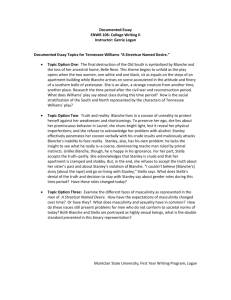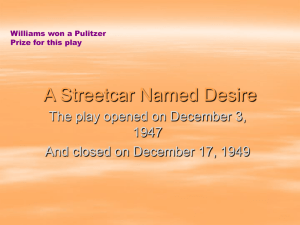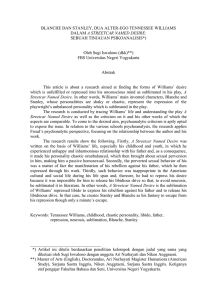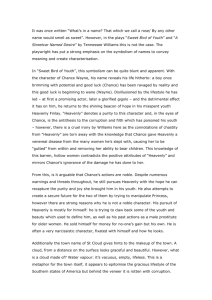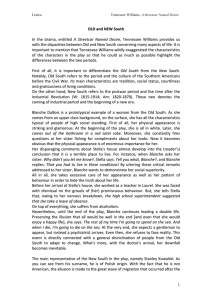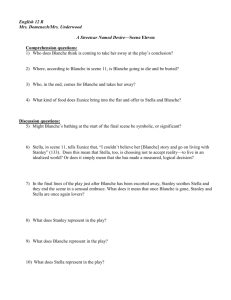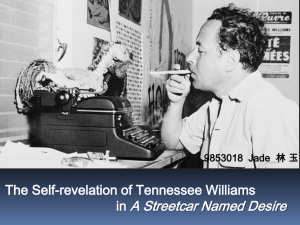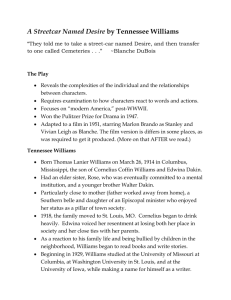A Streetcar Named Desire- Historical, cultural
advertisement
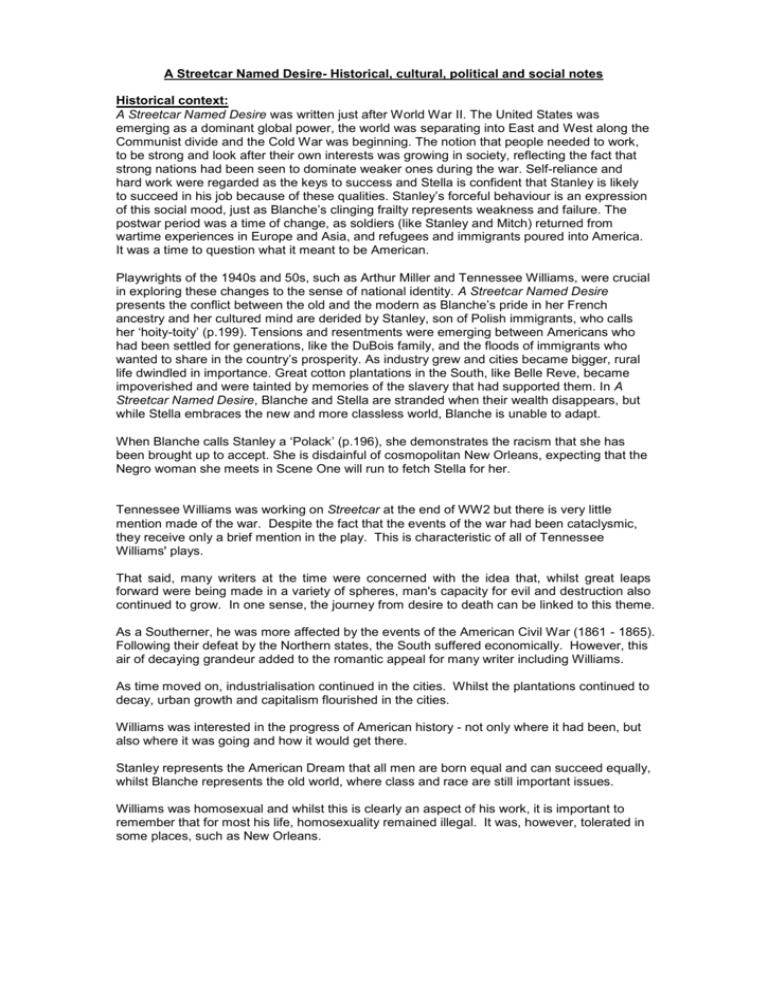
A Streetcar Named Desire- Historical, cultural, political and social notes Historical context: A Streetcar Named Desire was written just after World War II. The United States was emerging as a dominant global power, the world was separating into East and West along the Communist divide and the Cold War was beginning. The notion that people needed to work, to be strong and look after their own interests was growing in society, reflecting the fact that strong nations had been seen to dominate weaker ones during the war. Self-reliance and hard work were regarded as the keys to success and Stella is confident that Stanley is likely to succeed in his job because of these qualities. Stanley’s forceful behaviour is an expression of this social mood, just as Blanche’s clinging frailty represents weakness and failure. The postwar period was a time of change, as soldiers (like Stanley and Mitch) returned from wartime experiences in Europe and Asia, and refugees and immigrants poured into America. It was a time to question what it meant to be American. Playwrights of the 1940s and 50s, such as Arthur Miller and Tennessee Williams, were crucial in exploring these changes to the sense of national identity. A Streetcar Named Desire presents the conflict between the old and the modern as Blanche’s pride in her French ancestry and her cultured mind are derided by Stanley, son of Polish immigrants, who calls her ‘hoity-toity’ (p.199). Tensions and resentments were emerging between Americans who had been settled for generations, like the DuBois family, and the floods of immigrants who wanted to share in the country’s prosperity. As industry grew and cities became bigger, rural life dwindled in importance. Great cotton plantations in the South, like Belle Reve, became impoverished and were tainted by memories of the slavery that had supported them. In A Streetcar Named Desire, Blanche and Stella are stranded when their wealth disappears, but while Stella embraces the new and more classless world, Blanche is unable to adapt. When Blanche calls Stanley a ‘Polack’ (p.196), she demonstrates the racism that she has been brought up to accept. She is disdainful of cosmopolitan New Orleans, expecting that the Negro woman she meets in Scene One will run to fetch Stella for her. Tennessee Williams was working on Streetcar at the end of WW2 but there is very little mention made of the war. Despite the fact that the events of the war had been cataclysmic, they receive only a brief mention in the play. This is characteristic of all of Tennessee Williams' plays. That said, many writers at the time were concerned with the idea that, whilst great leaps forward were being made in a variety of spheres, man's capacity for evil and destruction also continued to grow. In one sense, the journey from desire to death can be linked to this theme. As a Southerner, he was more affected by the events of the American Civil War (1861 - 1865). Following their defeat by the Northern states, the South suffered economically. However, this air of decaying grandeur added to the romantic appeal for many writer including Williams. As time moved on, industrialisation continued in the cities. Whilst the plantations continued to decay, urban growth and capitalism flourished in the cities. Williams was interested in the progress of American history - not only where it had been, but also where it was going and how it would get there. Stanley represents the American Dream that all men are born equal and can succeed equally, whilst Blanche represents the old world, where class and race are still important issues. Williams was homosexual and whilst this is clearly an aspect of his work, it is important to remember that for most his life, homosexuality remained illegal. It was, however, tolerated in some places, such as New Orleans. Cultural and political context: Tennessee Williams saw the South as a broken and damaged place in which the decay was somehow charming. He said: I write out of love for the South … once a way of life that I am just able to remember – not a society based on money … I write about the South because I think the war between romanticism and the hostility to it is very sharp there. Williams is an almost completely non-political writer. More than any other American dramatist, he began to move away from writing about the large political issues to writing about the emotional burdens of everyday life. The tensions in this play come partly from cultural conflict – the worlds of Stanley and Blanche are so opposed that neither can understand the other. The setting of A Streetcar Named Desire betrays the post-war tension between the sexes. Stanley wants to dominate his home, in the same way males had dominated American society before the war. Social context: Women in the Old South had a social and symbolic role, were expected to be passive and chaste. This world could not give Blanche what she needed (see scene 5) and so she tried to marry into the 'light and culture', she discovers that there is corruption and deceit behind the façade. All of the Southern writers seemed to have vivid imaginations which were often bizarre and grotesque (Southern Gothic). The roots of this literature lay perhaps in the fact that the writers knew that they were part of a dying culture - where the dashing and romantic were founded on an economy based on injustice and cruelty. Blanche and Stanley are from different worlds where money has different values. Art and Cultural Diversity in the French Quarter: From another perspective, A Streetcar Named Desire can be seen as a thriving, exuberant atmosphere, one that nurtures an open-minded sense of community. In the play's beginning, two minor female characters are chatting. One woman is black, the other white. The ease at which they communicate demonstrates the casual acceptance of diversity of the French Quarter. In the low-income world of Stella and Stanley Kowalski, racial segregation appears non-existent, a sharp contrast to the elitist realms of the old South (and Blanche Dubois' childhood). As sympathetic as Blanche may appear, she often says intolerant remarks about class, sexuality (in the case of her homosexual husband who was devastated by her negative comments), and ethnicity. In fact, in a rare moment of political-correctness, Stanley insists that Blanche refer to him as an American (or at least Polish-American) rather than use the derogatory term: "Polack." For all Blanche's preaching about poetry and art, she never acknowledges the beauty of the jazz and blues which permeates the setting. A uniquely American art form, the music of the blues provides a transition for many of the scenes within Streetcar. It could represent change and hope -- but it goes unnoticed to Blanche's ears. Belle Reve's style of aristocracy has died away, and its art and gentile customs are no longer relevant to Kowalski's post-war America.
